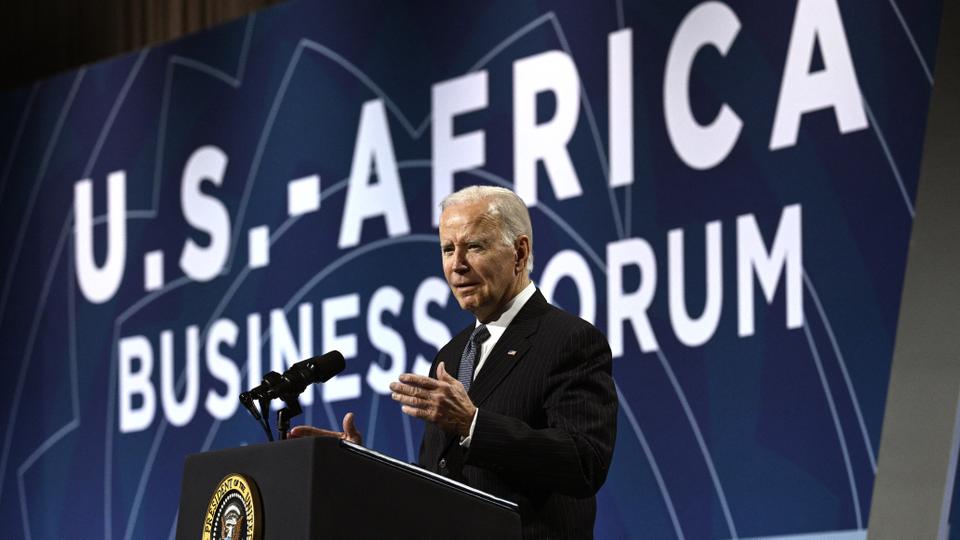President Joe Biden has called for a long-term partnership with Africa rooted both in trade and good governance as US businesses unveiled billions of dollars for the continent where China has become a top player.
Addressing a summit that brought 49 African leaders to the Washington cold on Wednesday, Biden avoided uttering Beijing’s name but made clear the United States would take a different approach.
At the first gathering since Barack Obama invited African leaders in 2014, Biden said the United States sought “partnerships — not to create political obligation, to foster dependence, but to spur shared success and opportunity.”
“When Africa succeeds, the United States succeeds. The whole world succeeds,” Biden said.
The Biden administration is laying out more than $55 billion in support over the three-day summit and on Wednesday welcomed US and African businesses, which promised more than $15 billion in trade deals.
Biden highlighted “the core values that unite our people — all our people, especially young people: freedom, opportunity, transparency, good governance.”
“Africa’s economic transition depends on good government, healthy populations and reliable and affordable energy,” he said.
Biden announced a $100 million aid package for clean energy and the White House announced another $800 million in public and private financing for digital development in Africa.
In the past decade, China has surpassed the United States in investing in Africa, mainly through evident infrastructure projects, often funded through loans that have totalled more than $120 billion since the start of the century.
Defense Secretary Lloyd Austin on Tuesday warned African leaders that both China and Russia were “destabilising” the continent, saying Beijing’s mega-contracts lacked transparency.
READ MORE:
US says China, Russia ‘destabilising’ Africa as it aims to woo its leaders
Investing in technology
In one of its biggest corporate announcements, credit card leader Visa said it would pump $1 billion into Africa to develop digital payments — an area in which China has emerged as a global leader.
Cisco and partner Cybastion said they would commit $858 million to bolster cybersecurity through 10 contracts across Africa, addressing a vulnerability that has held up online development.
The ABD Group said it would commit $500 million starting in Ivory Coast to adopt cloud technology through data centres that can work with major US technology firms.
Technology leader Microsoft said it would employ satellites to bring internet access to some 10 million people, half of them in Africa, hoping to bridge a digital divide that has held back the continent.
The project will prioritise internet access in parts of Egypt, Senegal and Angola that have not had access to the internet, often due to unreliable electricity.
Microsoft president Brad Smith said the company has been impressed by its engineers in Nairobi and Lagos.
The United States has made much of its infrastructure aid conditional on democratic standards.
Secretary of State Antony Blinken took part in the signing of a $504 million compact with Benin and Niger under the Millennium Challenge Corporation, which funds projects in countries that meet key standards on good governance.
The deal aims to connect Benin’s port of Cotonou with landlocked Niger’s capital Niamey, with the United States estimating benefits to 1.6 million people.
“For a long time we’ve considered this to be our natural port,” Niger’s President Mohamed Bazoum said.
He hailed the partnership with the United States and promised “institutional reforms” to support trade.
In a veiled allusion to China, Blinken said that the deal will not “saddle governments with debt.”
“Projects will bear the hallmarks of America’s partnership. They’ll be transparent. There’ll be high quality. They’ll be accountable to the people that they mean to serve,” Blinken said.
‘Not an arena for great power confrontation’
White House officials rejected the notion that the summit was in part about countering China’s influence.
National Security Council spokesperson John Kirby said the administration is “refusing to put a gun” to Africa’s head and make it choose between US and China.
At the same time, he said “there’s nothing inconsistent about calling a fact a fact and shedding light on what is increasingly obvious to our African partners about China’s malign influence on the continent.”
Still, the summit-related activity got a rise out of China.
Foreign Ministry spokesperson Wang Wenbin said the US should “respect the will of the African people and take concrete actions to help Africa’s development, instead of unremittingly smearing and attacking other countries.”
Wang said at a briefing on Wednesday that it is the “common responsibility of the international community to support Africa’s development.”
But he added: “Africa is not an arena for great power confrontation or a target for arbitrary pressure by certain countries or individuals.”
READ MORE:
How China outsmarted US in Africa




















































Be First to Comment